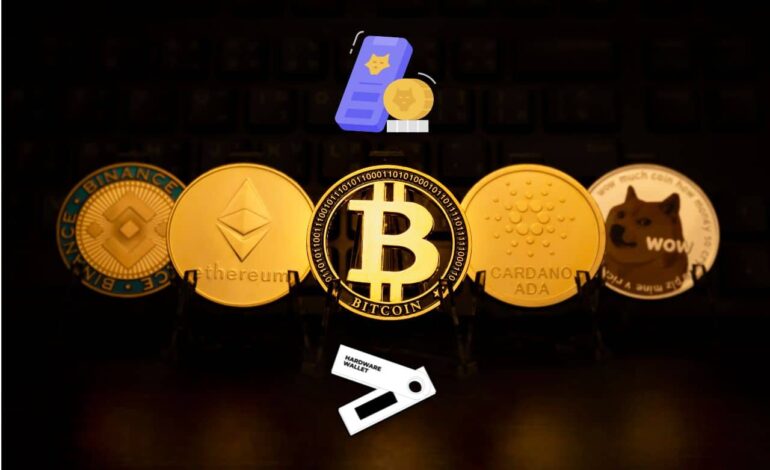What is a Cryptocurrency Exchange?
A cryptocurrency exchange is a platform where you can buy, sell, and trade various cryptocurrencies (Crypto). Similar to other financial investment sectors like stocks or Forex, you need to create an account on the exchange to start investing and trading. In the cryptocurrency market, there is an additional element of Decentralized Exchanges (DEX) alongside the Centralized Exchanges (CEX) found in traditional markets like stocks or FX.
So, what exactly is a Decentralized Exchange? What is a Centralized Exchange? How do these two types of exchanges differ? Let’s delve into the details with izyCrypto in this article.
Centralized Exchange (CEX)
A Centralized Exchange (CEX) is a platform where coins are traded between market participants. These exchanges are managed by third-party companies or organizations that create a platform to connect users for buying and selling needs. To trade on a centralized exchange, users need to create an account and transfer their assets (coins) to wallets on the exchange. Essentially, your assets are held on the exchange for trading purposes.
Top centralized exchanges globally include Binance, Coinbase, Kucoin, etc. Among these, Binance stands out as the leading exchange, accounting for over 25% of the total trading volume in the cryptocurrency market.

Interface of the Binance Centralized Exchange
Decentralized Exchange (DEX)
A Decentralized Exchange (DEX) operates differently, as all transactions occur automatically and directly between users (peer-to-peer) without a third-party intermediary holding your funds. To trade on a DEX, you only need to store your coins in software wallets, connect the wallet to the exchange, and proceed with transactions. After trading, your assets return to your wallet, and you can disconnect from the exchange.
Different blockchain networks have their own DEX platforms. For example, Pancake Swap operates on the Binance Smart Chain (BSC), while Uniswap runs on the ERC20 platform. Some DEX platforms now support multiple networks, though they are not yet fully optimized.
Top decentralized exchanges today include Uniswap, PancakeSwap, 1inch, Sushiswap, MDEX, and others.

Interface of the PancakeSwap Decentralized Exchange
Differences Between Decentralized (DEX) and Centralized (CEX) Exchanges
The table below comparing centralized and decentralized exchanges will help you understand the differences between these two types of platforms. The fundamental difference lies in their names: centralized exchanges involve a third party holding assets, while decentralized exchanges keep assets in individual users’ wallets.
| Centralized Exchange (CEX) | Decentralized Exchange (DEX) | |
| Storage | Coins/Tokens are stored in the exchange’s wallets. | Coins/Tokens are stored in your own software wallet. |
| Asset Control (from a technical perspective) | When stored on the exchange, you lose control over your assets. This doesn’t mean you can’t trade or withdraw, but technically, you can’t transact those funds on the blockchain. | You manage your assets in your personal wallet, with private keys. Transactions are entirely under your control and executed on the blockchain of the respective platform. |
| Trading | Trades occur off-chain, with the exchange adjusting balances within its internal database. | Transactions are direct and peer-to-peer on the blockchain, without third-party involvement. |
| Security | Security measures provided by the exchange: User/Password, SMS, Auth, Email, etc. | Private keys securing your wallet. |
| Risks | Account hacking, exchange collapse, account freezing, etc. | Loss or forgetting of private keys. Potential for connecting to scam DApps, leading to asset loss. |
| Advanced Features | Better support for advanced features like limit orders, stop-loss, etc. | Mostly supports basic buy and sell transactions, with limited additional functionalities. |
| Blockchain Platforms | Most exchanges support multiple blockchain platforms. | Typically, each DEX operates on a specific platform, such as Ethereum, Binance Smart Chain (BSC), or TRON. |
Top Cryptocurrency Exchanges Today
To explore reputable cryptocurrency exchanges, visit Coinmarketcap for information on both centralized and decentralized exchanges, including ratings and rankings. Below is a summary of some of the most trusted centralized and decentralized exchanges today.
Top Trusted Centralized Exchanges
According to Coinmarketcap rankings, Binance remains the top centralized exchange, accounting for 20% of the total market trading volume (nearly $6 billion in 24 hours as of July 2023). Binance continues to be a popular choice among traders.
Read more: Guide to Creating an Account on Binance
Other highly rated exchanges include: Coinbase, Kucoin, OKEX, Kraken, and more.

Top Centralized Exchanges (CEX)
Top Trusted Decentralized Exchanges
Each blockchain ecosystem has its own DEX platforms. These decentralized exchanges function as DApps (Decentralized Applications) on their respective blockchains.
According to Coinmarketcap, the leading DEXs for various networks include:
- Ethereum: dYdX, Uniswap, and more.
- BSC (Binance Smart Chain): PancakeSwap
- Polygon: Kine Protocol
- Some DEXs operate on multiple platforms (Multi-chain but not yet fully integrated with multi-chain bridges): Balancer, Apex Protocol, and others.

Top Decentralized Exchanges (DEX)
The information above provides an overview of cryptocurrency exchanges, highlighting the differences between centralized and decentralized platforms. Understanding how these exchanges operate will help you navigate the process of trading and exchanging cryptocurrencies effectively.



